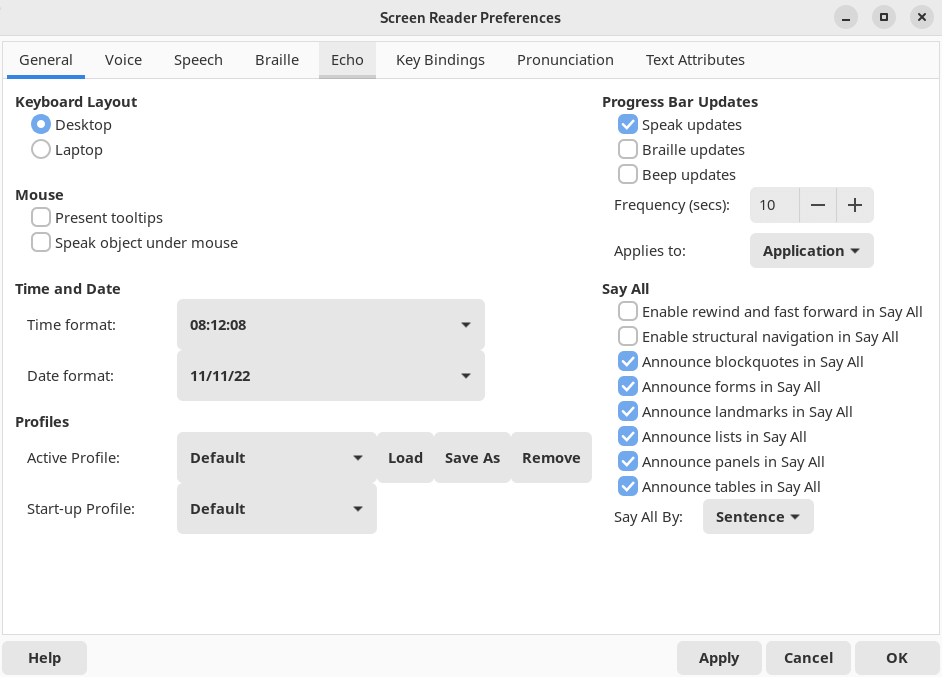Orca Screen Reader (Orca) is a free, open source scriptable screen reader which provides access to applications and toolkits. It provides alternative access to the desktop by using speech synthesis, braille, and magnification.
Orca also provides a flexible, extensible, and powerful assistive technology that provides end-user access to applications and toolkits that support the AT-SPI (e.g. the GNOME desktop). With early input from and continued engagement with its end users, Orca has been designed and implemented by the Sun Microsystems, Inc., Accessibility Program Office.
Orca defines a set of default behaviors (reactions to application events) and key bindings (reaction to user key presses). These default behaviors and key bindings can be overwritten on a per-application basis. Orca creates a script object for each running application, which merges both the default behaviors and key bindings, and the application specific ones. Orca provides the infrastructure to activate and deactivate scripts, as well as a host of services accessible from within the scripts.
Features include:
- Screen reader enables non-visual access to standard applications in the GNOME Desktop by using speech and braille output.
- Magnifier provides automated focus tracking and full-screen magnification to aid low-vision user.
- Voice type: Default, Uppercase, Hyperlink, System.
- Speech synthesizer: Default, espeak, dummy.
- Control rate, pitch, volume, and person.
- Verbosity (brief, verbose).
- Braille support.
- Keyboard modes – desktop and laptop keyboard layouts.
- Key echo.
- Key bindings.
- Pronunciation dictionary.
- Text attributes.
Website: orca.gnome.org
Support:
Developer: The Orca Team
License: GNU General Public License v2.0

Orca is written in Python. Learn Python with our recommended free books and free tutorials.
Return to Speech Synthesis Tools | Return to Screen-Readers | Return to Universal Access
| Popular series | |
|---|---|
| The largest compilation of the best free and open source software in the universe. Each article is supplied with a legendary ratings chart helping you to make informed decisions. | |
| Hundreds of in-depth reviews offering our unbiased and expert opinion on software. We offer helpful and impartial information. | |
| The Big List of Active Linux Distros is a large compilation of actively developed Linux distributions. | |
| Replace proprietary software with open source alternatives: Google, Microsoft, Apple, Adobe, IBM, Autodesk, Oracle, Atlassian, Corel, Cisco, Intuit, and SAS. | |
| Awesome Free Linux Games Tools showcases a series of tools that making gaming on Linux a more pleasurable experience. This is a new series. | |
| Machine Learning explores practical applications of machine learning and deep learning from a Linux perspective. We've written reviews of more than 40 self-hosted apps. All are free and open source. | |
| New to Linux? Read our Linux for Starters series. We start right at the basics and teach you everything you need to know to get started with Linux. | |
| Alternatives to popular CLI tools showcases essential tools that are modern replacements for core Linux utilities. | |
| Essential Linux system tools focuses on small, indispensable utilities, useful for system administrators as well as regular users. | |
| Linux utilities to maximise your productivity. Small, indispensable tools, useful for anyone running a Linux machine. | |
| Surveys popular streaming services from a Linux perspective: Amazon Music Unlimited, Myuzi, Spotify, Deezer, Tidal. | |
| Saving Money with Linux looks at how you can reduce your energy bills running Linux. | |
| Home computers became commonplace in the 1980s. Emulate home computers including the Commodore 64, Amiga, Atari ST, ZX81, Amstrad CPC, and ZX Spectrum. | |
| Now and Then examines how promising open source software fared over the years. It can be a bumpy ride. | |
| Linux at Home looks at a range of home activities where Linux can play its part, making the most of our time at home, keeping active and engaged. | |
| Linux Candy reveals the lighter side of Linux. Have some fun and escape from the daily drudgery. | |
| Getting Started with Docker helps you master Docker, a set of platform as a service products that delivers software in packages called containers. | |
| Best Free Android Apps. We showcase free Android apps that are definitely worth downloading. There's a strict eligibility criteria for inclusion in this series. | |
| These best free books accelerate your learning of every programming language. Learn a new language today! | |
| These free tutorials offer the perfect tonic to our free programming books series. | |
| Linux Around The World showcases usergroups that are relevant to Linux enthusiasts. Great ways to meet up with fellow enthusiasts. | |
| Stars and Stripes is an occasional series looking at the impact of Linux in the USA. | |
